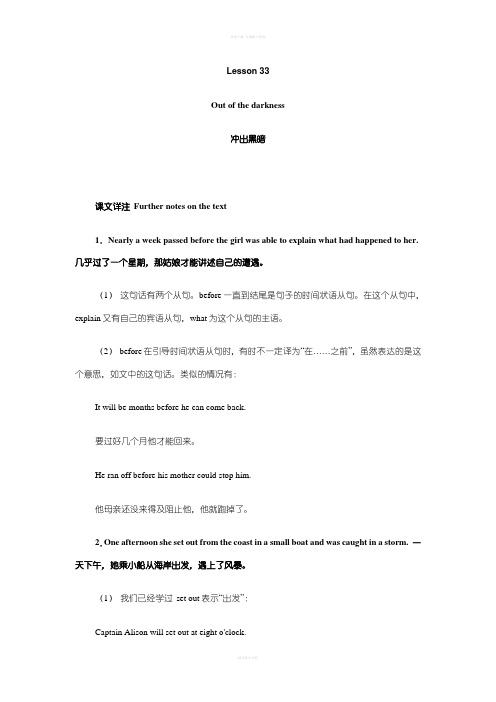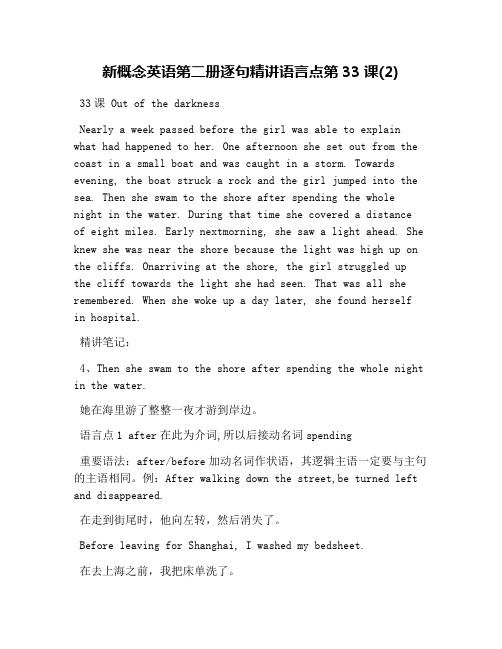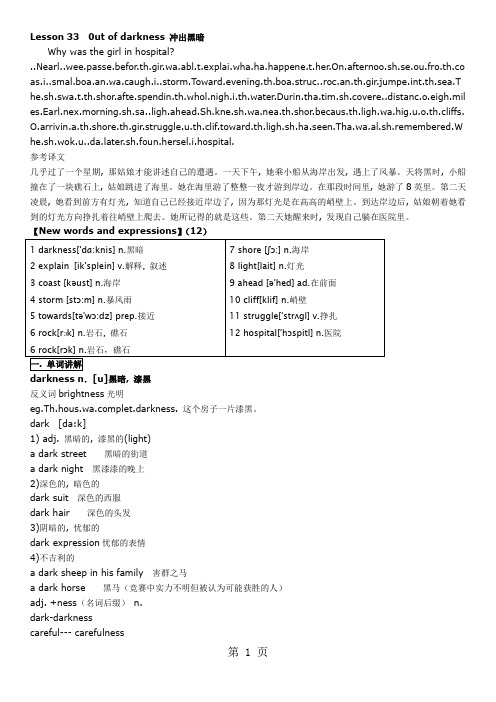新概念第二册33课讲解及答案
新概念英语第二册课后答案详解lesson33

新概念英语第二册课后习题谜底详解Lesson 33之迟辟智美创作新概念英语第二册课后习题谜底详解Lesson 33练习谜底 Key to written exercises1.关键句型练习谜底A 1 The girl set out from the coast.2 She jumped into the sea.3 She swam to the shore.B 1 to 2 from/out of 3 (up) to 4 for/ from5 from…to/ to…from6 at7 to8 fromC ( sample answers)1 A bird flew into the room.2 The parachutist jumped from the aeroplane.3 The child pointed at the fat lady.4 Put the milk in the refrigerator.2.难点练习谜底1 the other day2 passed3 next4 past3.多项选择题谜底1. d根据课文第2-4行One afternoon she set out from the coast in a small boat... Towards evening, the boat struck a rock and the girl jumped into the sea. 可以推测出只有 d. for about four hours(年夜约四小时)最接近女孩在船上所呆的时间. 因为她下午起航,将近薄暮时船遇难,所以她不成能在船上停留a. all day(一整天),b. allnight(一夜), c. for about 10 hours(年夜约10小时),所以d.是正确谜底.2. b根据课文第一句Nearly a week passed before the girl was able to explain what had happened 可以看出,只有b. but some time passed before she could explain what had happened to her 与课文的实际情况相符合,其他3个选择都不符合文章事实.3. d只有d. what happened to her? 最符合语法;而a. happen 分歧乎语法,如果是一般现在时,what 后面应跟双数形式的动词; b. was happened 语态分歧毛病,应为主动语态; c. happening 是现在分词,不能做谓语.4. a只有a. having spent 最符合语法和题目意思.这是现在分词的完成式,在句子中作时间状语,暗示已经完成的举措.b. having spending有语法毛病,having 后面应跟过去分词;c. when spending(当……勾留时)不符合题目意思,d. had spent 是过去完成时,不能做暗示时间的短语.5. c这个疑问句是对距离提问的,回答是Eight miles. a. away far 和 b. far from 都不符合语法; d. long(长)是对长度或时间提问的,不太合乎题目意思. 只有c. far away 最符合语法和题目意思.6. b只有b. any more 才华同前一句 That was all she remembered(她所记得的就是这些)的含义相同. a. some more 不能用于否定句中; c. no more 不符合题目意思,在否定句中不应该再用no more 而形成双重否定; d. none more 不是正确的表达方式.7. b只有b. to 最正确. 介词to暗示方向,有“向”,“去”“到”的含义,它可以同take 连用暗示“把……带到”.其他3个选择a. at the, c. in, d. in the 虽然都暗示地址,但没有“到”的含义,他们一般和睦take连用.8. c根据前一句She was caught in a storm(她遇上了狂风雨)的含义,本句需要选出描绘天气的词.a. fine(晴的),分歧乎题目意思.b. warm and sunny(暖和而有阳光的)也不符合题目意思.d. wet(湿润的)不够确切只有c. very rough(有狂风雨的,狂暴的)正确.9. c只有c. in front of (在……前面)同前一句中的ahead的意思相符;a. behind(在……后面), b. beside(在……旁边), d. above(在……上方) 词意思都分歧毛病.10. c本句的主语cliffs(悬崖峭壁)需要选出一个能描述它特征的形容词.a. narrow(窄的),b. wide(宽的) d. sharp(尖锐的)3个词都不能描述cliffs.只有c. steep(峻峭的)最合适.11. a前一句She struggled up the cliff (她挣扎着往峭壁上爬去)说明这是很不容易做的事情,所以只能选a. easy. 其他3个选择b. hard(艰苦的),c. difficult(困难的),d. long(长的)词意思都分歧乎题目意思.12. c本句需要选出一个与前一句的remembered(想起)意思相同的词.a. remind(提醒,使想起),与remember 意思不太一样.b. memorise (记住,熟记)强调用心去记或者背下来. d. mind(介意,留意)与remember 意思不太一样.只有c. recollect(想起,记起)与remember 意思相同.。
新概念第二册33课讲解及答案

Lesson 33Out of the darkness冲出黑暗课文详注Further notes on the text1.Nearly a week passed before the girl was able to explain what had happened to her. 几乎过了一个星期,那姑娘才能讲述自己的遭遇。
(1)这句话有两个从句。
before一直到结尾是句子的时间状语从句。
在这个从句中,explain又有自己的宾语从句,what为这个从句的主语。
(2)before在引导时间状语从句时,有时不一定译为“在……之前”,虽然表达的是这个意思,如文中的这句话。
类似的情况有:It will be months before he can come back.要过好几个月他才能回来。
He ran off before his mother could stop him.他母亲还没来得及阻止他,他就跑掉了。
2.One afternoon she set out from the coast in a small boat and was caught in a storm. 一天下午,她乘小船从海岸出发,遇上了风暴。
(1)我们已经学过set out表示“出发”:Captain Alison will set out at eight o'clock.艾利森船长将于8点钟启航。
set out from表示“从……出发”。
(2)be caught in表示某人“(突然)遇到/上(风暴等)”:He was caught in a heavy rain on the way home.他在回家途中遇到了大雨。
3.Then she swam to the shore after spending the whole night in the water. 她在海里游了整整一夜才游到岸边。
新概念英语第二册逐句精讲语言点第33课(2)

新概念英语第二册逐句精讲语言点第33课(2)33课 Out of the darknessNearly a week passed before the girl was able to explain what had happened to her. One afternoon she set out from the coast in a small boat and was caught in a storm. Towards evening, the boat struck a rock and the girl jumped into the sea. Then she swam to the shore after spending the whole night in the water. During that time she covered a distance of eight miles. Early nextmorning, she saw a light ahead. She knew she was near the shore because the light was high up on the cliffs. Onarriving at the shore, the girl struggled up the cliff towards the light she had seen. That was all she remembered. When she woke up a day later, she found herselfin hospital.精讲笔记:4、Then she swam to the shore after spending the whole night in the water.她在海里游了整整一夜才游到岸边。
语言点1 after在此为介词,所以后接动名词spending重要语法:after/before加动名词作状语,其逻辑主语一定要与主句的主语相同。
新概念2 lesson 33 讲解

• a) Your sister passed me in her new car yesterday. • b) I’ve passed/past my French test. • c) Can you tell me something about your past ? • d) Frank is proud of his past experience. • e) I went past the garden.
next
• 如果以现在为基准,则next前一般不加the; 如果以过去的某一时间为基准,则next前 面要加the或其他修饰词。两者表示时间概 念时,前者通常可以用于过去式或将来式 中,而后者只能用于过去时中.
• a) He plans to go to Paris next month. • b) John didn’t wake up until the next day. • c) Mary phoned the next day to tell us that she couldn’t come to the party.
• go to hospital 看病 • go to the hospital 去医院(看望病人) • in hospital 住院 • in the hospital 在医院 Hospital前不加the,表示抽象动作; 一旦加the,只表示地点
ahead
• • • • • • • adj. 放在被修饰词的后面作定语,定语后置,如: The road ahead was full of sheep. adv.预先,向前,提前 Pay ahead, and you'll receive a discount. 常见搭配 ahead of 在 ... 前面,先于 go aheare • I met him three years ago . • He said he had finished the work two days before.
新概念英语第二册笔记-第33课

Lesson 33 0ut of darkness 冲出黑暗Why was the girl in hospital?..Nearl..wee.passe.befor.th.gir.wa.abl.t.explai.wha.ha.happene.t.her.On.afternoo.sh.se.ou.fro.th.co as.i..smal.boa.an.wa.caugh.i..storm.Toward.evening.th.boa.struc..roc.an.th.gir.jumpe.int.th.sea.T es.Earl.nex.morning.sh.sa..ligh.ahead.Sh.kne.sh.wa.nea.th.shor.becaus.th.ligh.wa.hig.u.o.th.cliffs. O.arrivin.a.th.shore.th.gir.struggle.u.th.clif.toward.th.ligh.sh.ha.seen.Tha.wa.al.sh.remembered.W ter.sh.foun.hersel.i.hospital.参考译文几乎过了一个星期, 那姑娘才能讲述自己的遭遇。
一天下午, 她乘小船从海岸出发, 遇上了风暴。
天将黑时, 小船撞在了一块礁石上, 姑娘跳进了海里。
她在海里游了整整一夜才游到岸边。
在那段时间里, 她游了8英里。
第二天凌晨, 她看到前方有灯光, 知道自己已经接近岸边了, 因为那灯光是在高高的峭壁上。
到达岸边后, 姑娘朝着她看到的灯光方向挣扎着往峭壁上爬去。
她所记得的就是这些。
第二天她醒来时, 发现自己躺在医院里。
【New words and expressions】(12)darkness n.[u]黑暗, 漆黑反义词brightness光明plet.darkness. 这个房子一片漆黑。
dark [da:k]1) adj. 黑暗的, 漆黑的(light)a dark street 黑暗的街道a dark night 黑漆漆的晚上2)深色的, 暗色的dark suit 深色的西服dark hair 深色的头发3)阴暗的, 忧郁的dark expression忧郁的表情4)不吉利的a dark sheep in his family 害群之马a dark horse 黑马(竞赛中实力不明但被认为可能获胜的人)adj. +ness(名词后缀)n.dark-darknesscareful--- carefulnessgood ----goodnesscareless----carelessnessexplain V. 解释, 叙述, 辩解, 辩护, 成为…的理由explain sth to sb 对...解释…explain +that/wh 从句解释例: Could you explain that question once again?你能再解释一下那个问题吗?The manager explained to the customer why the goods were late.经理对客人解释为什么货物晚了。
新概念英语第二册课后练习题答案详解(第33课)

新概念英语第⼆册课后习题Lesson 33 1. d 根据课⽂第2-4⾏One afternoon she set out from the coast in a small boat... Towards evening, the boat struck a rock and the girl jumped into the sea. 可以推测出只有 d. for about four hours(⼤约四⼩时)最接近⼥孩在船上所呆的时间. 因为她下午起航,将近傍晚时船遇难,所以她不可能在船上停留a. all day(⼀整天),b. all night(⼀夜), c. for about 10 hours(⼤约10⼩时),所以d.是正确答案. 2. b 根据课⽂第⼀句Nearly a week passed before the girl was able to explain what had happened 可以看出,只有b. but some time passed before she could explain what had happened to her 与课⽂的实际情况相符合,其他3个选择都不符合⽂章事实。
3. d 只有d. what happened to her? 最符合语法; ⽽a. happen 不合乎语法,如果是⼀般现在时,what 后⾯应跟单数形式的动词; b. was happened 语态不对,应为主动语态; c. happening 是现在分词,不能做谓语。
4. a 只有a. having spent 最符合语法和题⽬意思。
这是现在分词的完成式,在句⼦中作时间状语,表⽰已经完成的动作。
b. having spending有语法错误,having 后⾯应跟过去分词;c. when spending(当……逗留时)不符合题⽬意思,d. had spent 是过去完成时,不能做表⽰时间的短语。
新概念英语第二册Lesson33
New words darkness explain coast storm towards rock shore light ahead cliff struggle hospital
and expressinos n.黑暗 v. 解释,说明 n.海岸 n. 暴风雨 prep. 朝,向,接近 n. 岩石 n. 海岸 n. 灯光 adv. 在前面 n. 峭壁 v. 挣扎 n. 医院
♂ storm n. 暴风(雨) 搭配: be caught in a storm 遭遇暴风雨 storm in a teacup 小题大做 take by storm 突然巧夺 1)在暴风雨中横渡海峡 cross the Channel in a storm 2)一阵弹雨 a storm of bullets(子弹) 3)一阵暴风雨般的掌声 a storm of applause 4)我们应该经风雨,见世面 We ought to face the world and brave the storm. 5)雨过天晴,否极泰来 After a storm comes a calm. 联想: a rainstorm 暴风雨 a snowstorm 暴风雪 a duststorm 沙尘暴
explaininterpret都含有解释的意思explain指解释不明之事interpret侧重用特殊的知识信念判断了解去阐明特别难懂的事情侧重用特殊的知识信念判断了解去阐明特别难懂的事情1heisexplaininghowamachineoperates2howdoyouexplainthispoem
几乎过了一个星期,那姑娘才能讲述自己的遭遇. 一天下午,她乘小船从海岸出发,遇上了风暴。 天将黑时,小船撞在了一块礁石上,姑娘跳进了 海里。 她在海里游了整整一夜才游到岸边。 在那段时间里,她游了8英里。 第二天凌晨,她看到前方有灯光,知道自己已经 接近岸边了,因为那灯光是在高高的峭壁上。 到达岸边后,姑娘朝着她看到的灯光方向挣扎着 往峭壁上爬去。 她所记得的就是这些。 第二天她醒来时,发现自己躺在医院里。
新概念英语第二册课后答案详解lesson33教案资料
新概念英语第二册课后答案详解l e s s o n33新概念英语第二册课后习题答案详解Lesson 33新概念英语第二册课后习题答案详解Lesson 33练习答案 Key to written exercises1.关键句型练习答案A 1 The girl set out from the coast.2 She jumped into the sea.3 She swam to the shore.B 1 to 2 from/out of 3 (up) to 4 for/ from5 from…to/ to…from6 at7 to8 fromC ( sample answers)1 A bird flew into the room.2 The parachutist jumped from the aeroplane.3 The child pointed at the fat lady.4 Put the milk in the refrigerator.2.难点练习答案1 the other day2 passed3 next4 past3.多项选择题答案1. d根据课文第2-4行One afternoon she set out from the coast in a small boat... Towards evening, the boat struck a rock and the girl jumped into the sea. 可以推测出只有 d. for about fourhours(大约四小时)最接近女孩在船上所呆的时间. 因为她下午起航,将近傍晚时船遇难,所以她不可能在船上停留a. all day(一整天),b. all night(一夜), c. for about 10 hours(大约10小时),所以d.是正确答案.2. b根据课文第一句Nearly a week passed before the girl was able to explain what had happened 可以看出,只有b. but some time passed before she could explain what had happened to her 与课文的实际情况相符合,其他3个选择都不符合文章事实。
新概念英语第二册笔记 第33课
Lesson 33 0ut of darkness 冲出黑暗Why was the girl in hospital?Nearly a week passed before the girl was able to explain what had happened to her. One afternoon she set out from the coast in a small boat and was caught in a storm. Towards evening, the boat struck a rock and the girl jumped into the sea. Then she swam to the shore after spending the whole night in the water. During that time she covered a distance of eight miles. Early next morning, she saw a light ahead. She knew she was near the shore because the light was high up on the cliffs. On arriving at the shore, the girl struggled up the cliff towards the light she had seen. That was all she remembered. When she woke up a day later, she found herself in hospital.参考译文几乎过了一个星期,那姑娘才能讲述自己的遭遇。
一天下午,她乘小船从海岸出发,遇上了风暴。
天将黑时,小船撞在了一块礁石上,姑娘跳进了海里。
她在海里游了整整一夜才游到岸边。
新概念第二册33课分析解析
New words and expressinos
• darkness n. 黑暗;暗
• out of the darkness 冲出黑暗 • The room was in darkness 房间一片漆黑
构词法 • dark (黑暗的)+ness(名词后缀)=darkness • careful(细心的)+ness=carefulness(仔细) • good+ness=goodness(仁慈)
• We have to try hard towards success. • 我们要努力朝成功前进 • He is walking towards here. • 他正朝这边走来。 • • • • rock n. 岩石,礁石;摇滚乐;摇摆 v, 摇摆;震惊 The boat struck a rock. 这艘船触礁了。 The President`s murder rocked the nation. 总统遇刺震惊了全球
• Be caught in • 往往是指遇上“灾难、困难不好的境遇” 。 • 我遇上了一场暴风雪 • I was caught in a snowstorm.
3. Towards evening, the boat struck a rock and the girl jumped into the sea. Towards & To的区别
• explaination n.说明解释 • You must give me an explanation. • 你必须给我解释解释. • 同义词 • interpret v. (用知识,理解,信念等等)解释
• • • • •
coast n. 海岸 shore n.海岸 She set out from a coast. seashore n. 海岸 beach n. 沙滩 bank n. 河岸,坝,堤
- 1、下载文档前请自行甄别文档内容的完整性,平台不提供额外的编辑、内容补充、找答案等附加服务。
- 2、"仅部分预览"的文档,不可在线预览部分如存在完整性等问题,可反馈申请退款(可完整预览的文档不适用该条件!)。
- 3、如文档侵犯您的权益,请联系客服反馈,我们会尽快为您处理(人工客服工作时间:9:00-18:30)。
Lesson 33Out of the darkness冲出黑暗课文详注Further notes on the text1.Nearly a week passed before the girl was able to explain what had happened to her. 几乎过了一个星期,那姑娘才能讲述自己的遭遇。
(1)这句话有两个从句。
before一直到结尾是句子的时间状语从句。
在这个从句中,explain又有自己的宾语从句,what为这个从句的主语。
(2)before在引导时间状语从句时,有时不一定译为“在……之前”,虽然表达的是这个意思,如文中的这句话。
类似的情况有:It will be months before he can come back.要过好几个月他才能回来。
He ran off before his mother could stop him.他母亲还没来得及阻止他,他就跑掉了。
2.One afternoon she set out from the coast in a small boat and was caught in a storm. 一天下午,她乘小船从海岸出发,遇上了风暴。
(1)我们已经学过set out表示“出发”:Captain Alison will set out at eight o'clock.艾利森船长将于8点钟启航。
set out from表示“从……出发”。
(2)be caught in表示某人“(突然)遇到/上(风暴等)”:He was caught in a heavy rain on the way home.他在回家途中遇到了大雨。
3.Then she swam to the shore after spending the whole night in the water. 她在海里游了整整一夜才游到岸边。
介词after的宾语是动名词spending及这个动名词的宾语、状语,这个结构在意义上等于after she had spent the whole nightin the water。
4.During that time she covered a distance of eight miles. 在那段时间里,她游了8英里。
(1)that time指上句话中提到的the whole night。
(2)cover可以笼统地表示“行过(一段路程)”,根据上下文可具体译为“走过”、“飞过”、“游过”等:The bird covered the distance in three minutes.这只鸟用3分钟飞完了全程。
(3)表示具体的距离可以用“a distance of+ 具体长度”这个结构。
5.high up on the cliffs,在高高的峭壁上。
up为形容词,表示“在上面的”、“高高的”、“在较高处的”,high为副词,修饰up。
6.On arriving at the shore, the girl struggled up the cliff towardsthe light she had seen.到达岸边后,姑娘朝着她看到的灯光方向挣扎着往峭壁上爬去。
(1)“on+ 动名词”相当于as soon as或when 引导的时间状语从句:On reaching the airport, he was arrested by the police.他一到机场就被警察逮捕了。
(2)she had seen为the light的定语从句,关系代词that/which省略了。
(3)up 在此处为介词,表示“沿着……往上”。
7.That was all she remembered. 她所记得的就是这些。
that指前面(从第2句话开始)描述的内容。
she remembered为all 的定语从句,关系代词that(不能用which)被省略了。
语法Grammar in use用于表示方向和目的地的介词和副词(也被称为小品词)(1)表示“上”、“下” 的两对小品词是on和off,up和down:Jim's standing on the roof. I hope he won't fall off.吉姆正站在房顶上。
我希望他不会掉下来。
Tom's climbing up the tree. I hope he won't fall down.汤姆正在爬树。
我希望他不要摔下来。
(2)表示“来”、“去” 的一对小品词是from和to;towards的意义与to相近,表示“朝”、“向”、“接近”等;for在有些动词后面也表示“往”、“向”的意思:He came from Moscow. He's going to New York.他从莫斯科来。
他将要去纽约。
The plane flies from Moscow to New York.这架飞机从莫斯科飞往纽约。
He went towards the shop quickly.他快速地向商店走去。
He went for home.他回家了。
He left/ set out for New York yesterday.他昨天动身去纽约了。
(3)表示“进去”、“出来” 这两种方向的介词为into和out of;表示“在某个地方”或“在……里面/外面”可用at,in,out of等;表示目的地或位置往往用at:When did you come into the restaurant?你什么时候进的餐馆?You weren't in the restaurant when I come in.我进来的时候你不在餐馆。
We ran out of the house.我们从屋里跑了出来。
We arrived in the country on Sunday.星期天我们到达乡下。
(范围大时用in)We arrived at the station in the evening.晚上我们到达车站。
(范围小时用at)(4)表示“穿过”、“越过”、“绕过” 等动作时,往往用through,across,under,over,round等介词:词汇学习Word study1.pass与past(1)动词pass的过去式为passed,过去分词为passed或past。
当它作及物动词用时,可以表示“经过”、“通过(考试)”或“超过”等,作不及物动词用时可以表示“(时间等)消逝”:You passed me without even noticing me!你从我身边经过时居然没注意到我!Your sister passed me in her new car, driving at great speed.你姐姐/妹妹开着她的新车从我身旁驶过,开得非常快。
I've passed/ past my French test.我法语考试通过了。
A month has passed/ past since I left home.我离开家已一个月了。
(2)past可以作形容词、介词、名词等。
作形容词时表示“以前的”、“过去的”等:Many things happened in the post week.过去的这一周内发生了许多事。
Frank is proud of his past experiences.弗兰克为自己以往的经历感到自豪。
作介词时它表示“经过”或“超出(范围等)”:He has just walked past me.他刚从我身边走过去。
His words are past my understanding.我不懂他的话。
作名词时它表示“过去”、“昔时”或“往事”等:Can you tell me something about your past?您能给我讲讲您过去的一些事吗?In the past, we used to gather under the Town Hall clock to welcome the New Year.我们过去常聚集在市政厅的大钟下面迎新年。
2.next与othernext表示时间顺序上“紧接的”、“下一个”。
如果以现在为基准,则next前一般不加the;如果以过去或将来的某一时间为基准,则next前面要加the或其他修饰词:See you next Friday.下个星期五再见。
Mary phoned the next day to tell us that she couldn't come to the party.第2天玛丽打来电话告诉我们她不能来参加晚会了。
the other day指时间时可以有a few days ago的意思:Mary phoned the other day to tell us that she had arrived in London.前几天玛丽来电话告诉我们她已到达伦敦。
1.关键句型练习答案A 1 The girl set out from the coast.2 She jumped into the sea.3 She swam to the shore.B 1 to 2 from/out of 3 (up) to 4 for/ from5 from…to/ to…from6 at7 to8 fromC ( sample answers)1 A bird flew into the room.2 The parachutist jumped from the aeroplane.3 The child pointed at the fat lady.4 Put the milk in the refrigerator.2.难点练习答案1 the other day2 passed3 next4 past 3.多项选择题答案1 d2 b3 d4 a5 c6 b。
